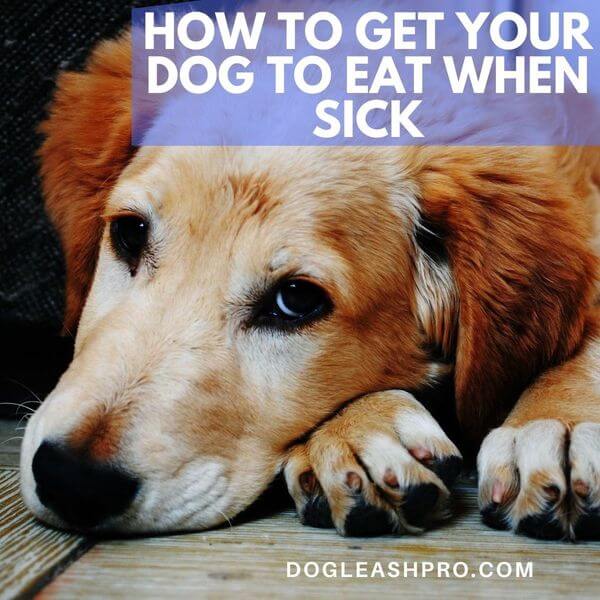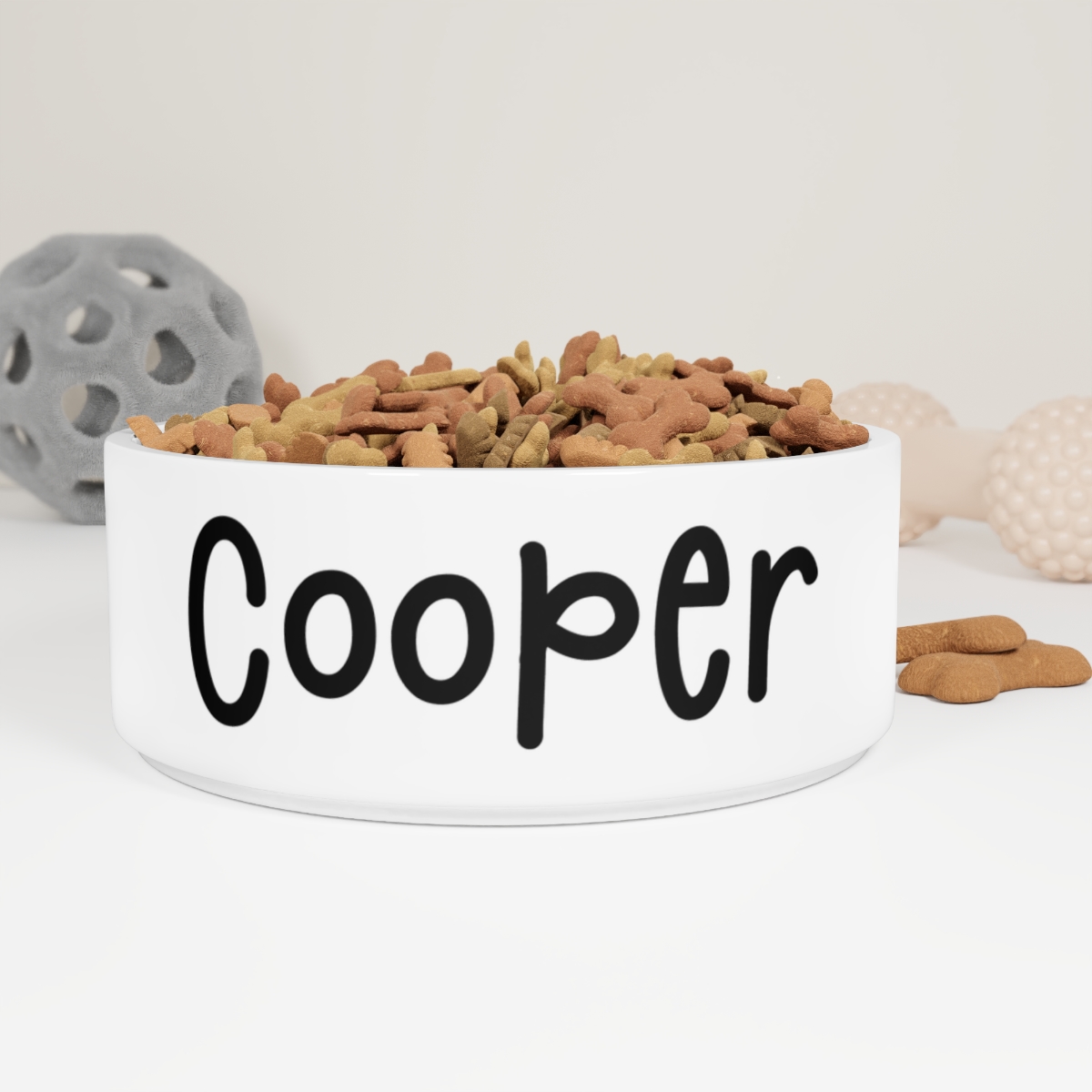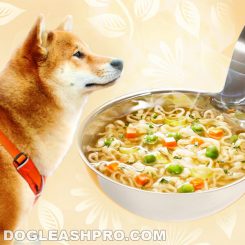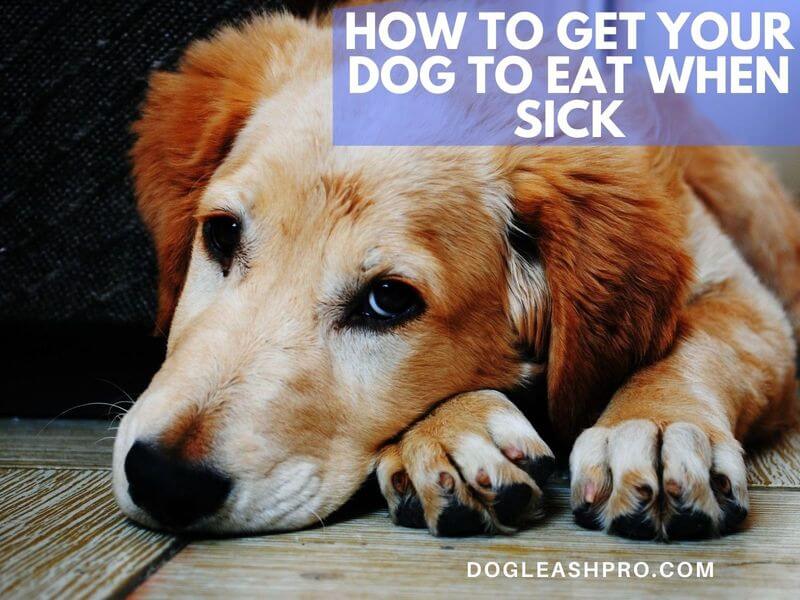
How to get your dog to eat when sick? There are a number of ways to encourage your dog to eat when sick including offering strong-smelling food, adding broth to the food, and diversifying the food. This will give your dog the calories and nutrition they need to properly heal, eat again, and become healthy.
It is challenging to watch our furry friends suffer from an illness or a disease. When dogs are sick, they may not have the appetite to eat, even if it’s their favorite meal. One missed meal is fine, but not eating for more than a day or two is concerning. This can affect their overall health and lead to life-threatening illnesses.
If you’re a dog breeder or owner who is concerned about how your sick dog’s eating habits may affect their health especially since they are stud Pitbull dogs, check out our article on Pitbull lifespan to learn more.
Table of Contents
How to get your dog to eat when sick: Here’s what you can do

When your dog does not eat, it can be a highly stressful situation for you. But don’t lose hope! Instead, there are several ways you can encourage and motivate them to eat again. We know this is not an easy task so here are some helpful pointers we’d like to share with you.
They include:
- Offer highly nutritious and tasty food with a strong delicious smell.
- Provide warm home-cook food.
- Switch to a different food brand than what they’re used to: dry food instead of canned food and vice versa or by a different brand.
- Add warm water into your dog’s meal to attract them to eat.
- Give your pups fewer treats.
- Take your dog for a walk so they will be hungry when it’s time to eat.
- Praise your pooch verbally when they’re eating.
- Use a dog feeder toy that dispenses food to make eating time more fun.
- Allow them to eat grass if they keep trying to do so.
- Use a syringe to feed your pup. You can feed them broth or wet food with the syringe. Ask your vet for advice on how to do this correctly.
- If your dog doesn’t like the syringe method, try hand-feeding small pieces of food to your pups.
- Ask your vet if medicinal appetite stimulants would help encourage your pooch to eat.
- Check with your vet if CBD oil may help.
If you’d like to know specifically what type of broth to use or how to make the food more strong-smelling, read on!
You may be interested in How Long Can A Dog Go Without Eating?
How to encourage your dog to eat when sick
Here’s how you can encourage or entice your pups to eat when they are sick.
One way is to add some mouth-watering flavors to your dog’s regular bland food. Add only flavors and scents that your dog finds delicious and appealing. If your pups love kibble prior to losing their appetite, try adding beef or chicken broth to it to accentuate the flavor and taste.
Another way is to go with warm homemade dog food. Add some water or healthy dog-friendly drinks into it so it’s easier for them to eat and it makes the food more appealing. This also helps them stay hydrated during the healing process.
You can add a little bit of tuna or other types of fish with a strong smell to the homemade food in order to attract your dog to eat. If your dogs do not like tuna, try a boiled chicken.
Make sure the food portion size is small. This way your dogs won’t feel anxious to try to finish it all if they can’t.
If your dog is still not eating, it’s crucial to consult with your dog’s vet as soon as possible. Your vet will find out why your sick dogs aren’t eating and will inform you of the right next step to take to help you encourage your dog to eat, including appetite stimulants or medications.
Check out How Long Can A Puppy Go Without Eating or Drinking?
What to feed a sick dog that won’t eat
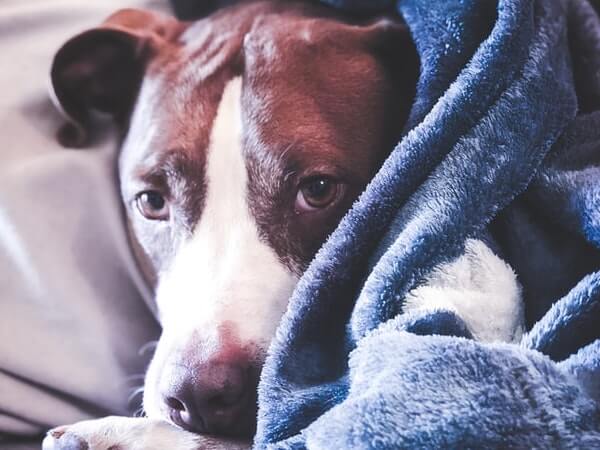
You must feed highly nutritious food to your dogs when they are sick. This will help them recover. You can feed them chicken and rice, pumpkin, shredded chicken, bone broth, and baby food. Keep reading to learn more about each and why they are the best food to feed your dogs when they are sick.
How to get your dog to eat when sick: 10 Best food to give a dog with no appetite
We will explain how each of the food below helps your dog when they are sick and do not have an appetite. We’ll go over the best suitable food depending on the type of illness or disease your dog may have.
According to a research paper done by the National Academy of Sciences, dogs need several nutrients to survive. These include water, fatty acids, carbohydrates, amino acids from proteins, minerals, and vitamins (view here). The list below contains these necessary nutrients.
1. Chicken and White Rice
If your dog is sick and they do not have an appetite to eat, is vomiting, or has diarrhea, the best food option is chicken and white rice. Chicken has protein while rice is full of carbohydrates.
Both chicken and white rice provide your pup the energy and nutrients they need. Since these two foods are bland, they won’t agitate your dogs’ sense of smell if they are currently sensitive to smell. This food also helps dogs with upset stomachs.
2. Shredded Chicken Breasts
The shredded chicken breasts are perfect for dogs with an upset stomach or who have been vomiting since they are easy to digest and contain essential vitamins, amino acids, fats, minerals your dogs need especially when they are sick.
Here’s how to prepare the shredded chicken breasts.
- Take 2 chicken breasts and place them on an aluminum foil-lined baking tray.
- Bake at 350℉ for 30 minutes.
- Make sure the inside of the chicken is not pink.
- Use 2 forks to shred the chicken breasts into smaller slices.
- If the chicken is still too hard to shred, bake the chicken breast for an additional 10 minutes.
3. Bone Broth
Bone broth is another popular food choice. You can add bone broth to your dog’s meal to make the food softer and easy to eat. This will also keep them hydrated. If your dog has dental pain or is sick with a swollen throat, this is the go-to food option.
Bone broth also does not upset your dog’s stomach or cause him to vomit. So if your dog has an upset stomach, give him the bone broth by itself.
Here’s how to prepare the bone broth.
- You can choose pork, chicken, or beef bones and place them into a pot.
- Add a little bit of dog-friendly vegetables such as broccoli, carrots, or peas.
- Small amounts of celery or potatoes are good vegetable options as well.
- Add 3 tablespoons of olive oils as well as ¼ cup of apple cider.
- Place all your ingredients into a crockpot.
- On low heat, cook for 24 to 48 hours.
- Then, strain the bones and allow the broth to cool down for a few minutes.
- Serve your pup the broth by itself or mixed with food.
4. Baby Food
Try baby food to stimulate your dog’s appetite if they are sick with no appetite. Baby food has a distinct smell that could attract your sick pup to eat. The soft baby is easy to swallow and great for their stomach. Many vets recommend feeding your sick dog Stage 2 meat-based baby foods including turkey, chicken, beef, or lamb.
Other baby food flavors that are alright to give your sick dog include:
- Banana baby food
- Pumpkin baby food
- Sweet Potato
Baby food flavors that are dangerous to dogs and that you should avoid at all costs:
- Garlic or garlic powder
- Onions or onion powder
You can find baby food at your local grocery store or supermarket. If your dogs need to take their medications orally, it’s a good idea to put the medication pill into the baby food.
5. Pumpkin
If your dog is sick and has diarrhea, adding a bit of pumpkin to your canine’s food can help. Pumpkin is packed with minerals and vitamins, including vitamin A, C, and E, iron, potassium, and other antioxidants so it is a fiber-rich food.
Dogs with diarrhea usually have upset stomachs. Having a bit of pumpkin can naturally increase the growth of healthy bacteria in their stomachs so they feel better again.
We recommend starting with just a little bit of pumpkin. A lot of fiber can cause your dog to get constipated.
Here’s what you can do:
- Add 1 tablespoon of plain pumpkin (without the skin or seeds) to your dog’s food.
- If your canine takes it well, add 2 tablespoons of plain pumpkin to their food.
Note that up to 3 tablespoons of plain pumpkin should be the daily limit. Make sure it is just plain pumpkin – no pumpkin pie flavoring or food with pumpkin in it as that can be dangerous for dogs.
Fun Fact: If your furry friends love pumpkin seeds, here are other seeds that are great for them. Check out Can My Dog Eat That Seed?
6. Tasty wet food
When a doggy gets sick, his body needs more water than usual to stay hydrated. A warm tasty wet food is a good option. It is easy to eat especially if your pup has dental pain or is healing from dental surgery. Wet food is also great for dogs that are nervous or have anxiety.
Find out How Long Can A Dog Go Without Water?
7. Fish
When fully cooked, fish is soft and easy to eat. They are fully packed with protein and omega-3 fatty acids that help to reduce inflammation. Fish also has a strong smell that will stimulate your dog’s appetite.
Here’s what you can do:
- Take the bone off of the fish.
- Boil the fish and add it to their regular dog food.
Do not serve raw fish to your sick dogs. Consuming raw fish is toxic for dogs. Veterinarians often recommend fully cooked fish as an alternative to chicken.
A moderate amount of fish is a great food option if your canines are sick and are experiencing the following type of problems:
- Dogs with an upset stomach. Do not feed them too much fish as that can further upset their stomach.
- Teeth or jaw pain.
- Have depression or anxiety.
- Mother dogs experiencing postnatal depression.
Fun Fact: Fish is great for dogs, but what about fish heads? Find out in our article Can Dogs Eat Fish Heads?
8. Sweet Potato
If your pups have intestinal issues, sweet potato is a great food choice. Similar to fish, they should be thoroughly cooked. When dogs eat raw sweet potatoes, it is dangerous as it can lead to intestinal blockages and can further upset their stomach.
Sweet potato contains vitamins like A, B6, and C and is high in fiber so it’s a great choice for sick dogs with an upset stomach. It can also be served as a low-calorie treat.
Here’s what you can do:
- Boil one or two sweet potatoes for 10 to 20 minutes.
- Peel off the skin.
- Cut them into small chunks.
- Make sweet mashed potatoes. Make sure the potato is smooth.
- Add them to your dog’s regular food or give a small amount to stimulate their appetite.
9. Cooked eggs
Fully cooked eggs are soft for dogs to chew. Additionally, they provide your pups with calcium, vitamins, antioxidants, and protein.
10. Mushrooms
Yes, you read that right. Mushrooms have a strong smell and give your canine nutrients and vitamins.
5 Reasons why your dog won’t eat

Now that we know what are the best food options to give our dogs when they are sick and how we can help them, let’s discuss what may be causing this behavior. Finding the root of the problem is crucial. These reasons include:
1. Illness
If your dogs are food lovers, a sudden decrease in appetite is alarming. While a loss of appetite does not indicate a serious problem, it’s important to pay attention and observe them. Detecting this early will safeguard them from significant illnesses such as infections, kidney failure, liver failure, cancer, or pain.
2. Recent vaccination
Although the vaccinations are life-saving, your pups may have experienced side effects from them. These side effects include a temporary disinterest in food. After a few days, they will regain their appetite for food again.
3. Dental disease or pain
If your dog does not want to eat, maybe it has nothing to do with its appetite for food. Instead, it could be that they are suffering from tooth pain and are unable to eat.
Take a look at their teeth and gums and see if you spot any broken or loose teeth. If you are unsure, see your vet so they can check for oral tumors and find out if your pooch has severe gingivitis.
4. Behavior issues
Perhaps you’ve noticed recently that your dogs may be picky with the food you’re giving them.
Observe their behaviors carefully and see if it is due to other reasons like not being able to reach the dog bowl or if they feel uncomfortable when someone is watching them eat.
5. Unfamiliar environment
Being in an unfamiliar environment can make them feel confused, nervous, and uncomfortable. This could be the reason why your dogs are not eating.
How to know if your dog is sick?

Dogs lack the ability to tell us how they feel. Have they recently suffered an infection or a disease? Did they recently have surgeries and are recovering from it? Perhaps they are stressed or anxious or it could be due to the fact that they are aging.
There are a few symptoms to look for that will let us know if they are unwell or sick. These symptoms will tell us the general health and well-being of your pooch.
Here are some symptoms to look out for:
- Changes in personality.
- Sudden weight loss.
- Respiratory symptoms.
- Difficulty when going potty.
- Loss of appetite.
- Repeated sneezing, vomiting, or coughing.
- Diarrhea.
- Swollen gums.
- Runny eyes or nose.
- Flaking skin.
- Feeling lethargic or lack of interest in daily activities.
- Vomiting right after eating.
If your pooch is showing any of the above signs and symptoms, speak with your vet right away. Early detection is key and they will examine your dog as well as performing necessary tests.
Should you force-feed your dogs when they are sick?
It depends. You should consult with your veterinarian first. If your pups are vomiting or are having diarrhea, inform your vet right away. They may use IV fluids, which is the more appropriate solution to keep your dog hydrated.
Note that any food you feed your dogs when they are sick and vomiting will only come right back up so force-feeding may not be the best option.
If your pups are sick, stressed out, and need a bit of your help to eat, then it is necessary. Ask your vet for advice on the proper way to force-feed your little furry friend. This way, you can prevent any potential problems like choking or getting food into their lungs.
How do you diversify the food so your dogs will eat?
Dogs, like humans, love the diversity in their diet. When they are sick and do not have an appetite, try diversifying their food. Give them nutritional-rich-diet with protein, some healthy grains, and veggies.
Feed your furry little ones fruits and vegetables like bananas, carrots, peas, pumpkins, apples, and blueberries. For meat options, try salmon, turkey, beef, and chicken to help them regain their energy.
Giving your dogs a treat to stimulate appetite when they’re sick
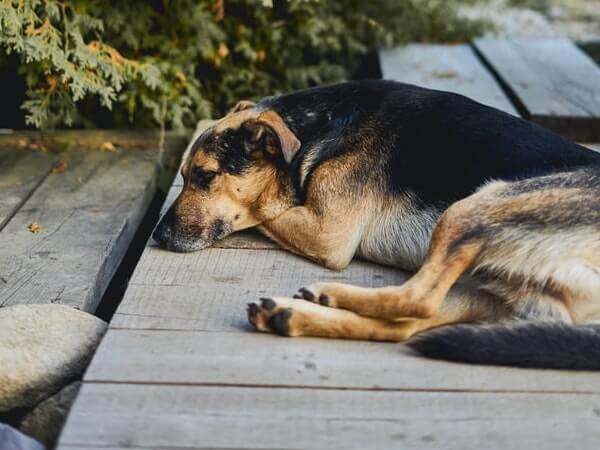
If you want to give little treats to your sick doggie, then it should be a healthy low-calorie treat. Start giving them small amounts of carrots, beans, apples, sweet potatoes, or cooked pumpkins in their regular food. Vegetables like kale and snap peas would be good for your pups as well.
Avoid giving harmful treats like pig ears, cow hooves, or cooked bones to them when they’re sick.
Is proper hydration crucial in the healing process?
Proper hydration is extremely important in the healing process of your sick pup. Remember never to force your pup to drink water as it can lead to aspiration pneumonia.
But how do you know if your dog is dehydrated? Here are some signs and symptoms of dehydration:
- Dry eyes, nose, and gums.
- Loss of appetite.
- Loss of skin elasticity.
- Lethargic.
- Panting.
Here’s what you can do if your dogs are not interested in drinking when they are sick or in pain:
- Give your canine 1 or 2 ice cubes to lick. It can also be a treat.
- Add some ice cubes to your puppy’s water bowl to attract them to drink.
- With water in your hand, allow your pup to lick the water.
- Feed your dog canned food as there is high water to food ratio.
- Add some flavorful broth or warm water to their regular food.
- Ask your vet if small amounts of Pedialyte would help.
Avoid these food when your dog is sick
If your dog is sick, they should not have the following food, drinks, and stimulants:
| Food to Avoid: | Reasons: |
| Avocado | Avocado can make your dog sick. The seed is also dangerous for dogs. |
| Grapes or Raisins | Eating grapes or raisins can affect a dog’s kidney and cause kidney failure. |
| Onions | Consuming onions can poison your dog and cause anemia. |
| Garlic | Consuming garlic can poison your dog and cause anemia. |
| Chocolate | Eating chocolate can cause death, diarrhea, and vomiting. |
| Macadamia Nuts | This can cause your dog to vomit or have muscle spasms. |
| Drinks to Avoid: | Reasons: |
| Milk | Surprisingly, milk can cause digestive problems and diarrhea. |
| Alcohol | Definitely a no-no. It can lead to death, breathing problem, and vomiting. |
| Other ingredients and stimulant to avoid: | Reasons: |
| Xylitol | This ingredient can affect your dog’s blood sugar level and lead to liver failure. |
| Caffeine | This is plain dangerous for your canines. |
| Medication not prescribed for your dog | Dogs should only take medication that is prescribed for them. Other medications are deadly and make them sick. |
When should you speak with your vet about this?
We recommend that you bring your canine friends to the vet right away as soon as you notice a change in their behavior and mood. When your pups are not eating, it can be concerning and it’s crucial to know the root cause for this behavior.
If you notice your dog having diarrhea or vomiting more often than before, speak with your vet immediately.
Dog Medicines
Ask your veterinarian if giving your canine the following medicines would help. Ask them for their advice on when they should take these medicines.
PeptoBismol
If your pup is suffering from mild diarrhea, gas, indigestion, or vomiting, speak with your vet to see if PeptoBismol could help. The recommended dosage of PeptoBismol is 1 teaspoon for every 10 pounds. This medication should be given to your doggy after every 6 to 8 hours. You should immediately consult with your vet if there are any reactions.
Pepcid
This is one of the most recommended medicines by veterinarians to cure gastrointestinal problems among pets. The dosage of this depends on your dog’s body size and age. Generally, it is given in a dosage of 10 mg for a 20-pound dog, twice a day, usually on an empty stomach.
Consult with a professional vet before giving this to your four-legged friends.
Imodium
Imodium is used to treat diarrhea, difficult bowel syndrome, and colitis. The recommended dosage of Imodium is 1 capsule of 2mg per 50-pound dog. The liquid form of Imodium AD is given 0.3 to 0.6 mL per pound at least twice a day.
Although this drug is safe for dogs, consult with your vet before making any decision.
Be patient
Be patient with your furry friends. Give them some time. Like humans, when they are sick they may not be hungry. It’s best to leave your dog’s food there in their dog bowl. They’ll look at it throughout the day and will naturally start eating it when they’re hungry.
When they are eating, encourage them with praise and petting. Make sure to stay near them and observe them carefully.
Lasting Thoughts
Your furry family members are one of your top priority and you must do everything you can to make them feel better. The above-mentioned guide will help encourage your sick doggies to eat during the healing process. Don’t delay in taking them to the vet as soon as you suspect unusual eating behaviors. Early detection is key to keeping your canine friends healthy and happy.
FAQS
The best food for a sick dog is chicken and rice, pork, bone broth (from chicken, pork, or beef), pumpkin, baby food, and similar nutritious food.
Try the following food if your dog has stomach problems: Chicken and white rice, shredded chicken breasts, bone broth, sweet potato, baby food, and pumpkin. If they refuse to eat due to a lack of appetite, speak with your vet and see if IV fluids will help keep them hydrated and fed.
Eggs are one of the best sources of protein and contain essential fatty and amino acids. When the eggs are well cooked, they can help your dog with an upset stomach. They are also a great training treat.
We do recommend confirming with your veterinarian first to see if you can give your dog some scrambled eggs.
A small amount of tuna is alright to give your dogs with an upset stomach. We recommend going with white fish because they are easy to digest and not likely to irritate your dog’s digestive system.
Provide your dog with food that has a strong smell to jump-start his appetite. Get creative and hide the pills into this regular food. To hide the pill, you can coat it with cream cheese, peanut butter, cottage cheese, or liverwurst. Alternatively, you can hide the pill inside meatballs or in baby foods.
Always keep in mind to never shove any food, whether kibble or wet food, down a dog’s throat. This is dangerous and can lead to bad consequences. If you have to force-feed a dog who won’t eat, try smearing a bit of baby food on your dog’s lip. Alternatively, you can use a needleless syringe with broth to keep your dog hydrated.
If you have to hand force-feed your sick dog, use a needleless syringe if other methods do not work. Add broth or warm water to the canned food and put it into a syringe. This way the canned food is watered down and easy for you to hand force-feed.
There are a number of things you can do if your dog is sick and does not eat her food including providing aromatic food to stimulate their appetite, diversifying the food variety, and worst-case scenario, bring them to the vet.
No. Grass is a natural remedy for dogs and may even help improve your dog’s digestive system or meet fiber and nutritional needs. Bread is not only unhealthy but also harder to digest. It also does not contain the same fiber as grass does.
If your dog won’t eat their food, you can diversify the food and add strong-smelling food to it. This will pique their appetite. Try canned food or home-made food. Do not provide as many treats as before and when they do eat, praise them for eating the food.
Not eating a meal or two is common, especially when it’s hot outside. However, after 2 missed meals, you should see the vet right away as it could be a sign of a more serious problem. Note that some illnesses or diseases can cause unusual eating habits in dogs.
DISCLAIMER: THIS WEBSITE DOES NOT PROVIDE MEDICAL ADVICE
The information, including but not limited to, text, graphics, images and other material contained on this website are for informational purposes only. No material on this site is intended to be a substitute for professional veterinary advice, diagnosis, or treatment. Always seek the advice of your veterinarian or other qualified health care provider with any questions you may have regarding a medical condition.

With over five years of specialized experience as an animal writer, my expertise lies in dog nutrition, health, behavior, grooming, and training. I am dedicated to delivering helpful and informative content that caters to the well-being of our furry friends. My primary goal is to empower pet owners with knowledge and ensure our canine companions thrive in health and happiness. In my free time, I love volunteering at local dog rescue centers.
